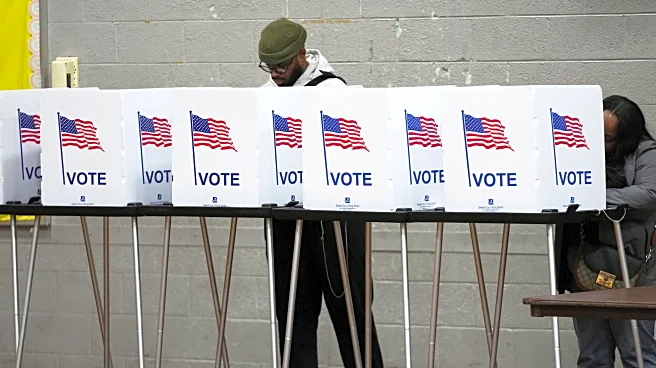What's Happening?
The U.S. stock market experienced another day of erratic trading, with the S&P 500 rising 0.4% and the Nasdaq composite climbing 0.7%. The Dow Jones industrial average, however, edged down slightly. This
volatility follows recent market fluctuations triggered by President Trump's threats of higher tariffs on China. Technology stocks, buoyed by positive earnings reports from companies like ASML, helped lift the market. Additionally, several major banks reported stronger-than-expected profits, contributing to market gains. However, concerns about the U.S. government's shutdown and its impact on economic data continue to loom over the market.
Why It's Important?
The stock market's volatility reflects broader economic uncertainties, including trade tensions and the government shutdown. These factors can influence investor sentiment and market stability, affecting both short-term trading and long-term investment strategies. The positive earnings reports from technology companies and banks provide some optimism, suggesting resilience in certain sectors. However, the lack of economic data due to the shutdown complicates the Federal Reserve's decision-making process, potentially impacting interest rates and economic growth. The situation underscores the interconnectedness of political actions and market dynamics.
What's Next?
Investors and market analysts will continue to monitor developments related to the government shutdown and trade negotiations with China. The Federal Reserve's upcoming decisions on interest rates will be crucial in shaping market expectations and economic outlook. Companies are under pressure to deliver strong profits to justify recent stock price gains, adding to the scrutiny of corporate earnings reports. As the situation evolves, stakeholders will need to adapt their strategies to navigate the uncertainties and capitalize on emerging opportunities.
Beyond the Headlines
The ongoing volatility in the stock market highlights the importance of diversification and risk management for investors. It also underscores the need for companies to maintain transparency and adaptability in their operations to withstand economic fluctuations. The situation may lead to increased scrutiny of corporate governance and financial practices, as stakeholders seek to ensure stability and resilience in the face of uncertainty. Additionally, the interplay between political decisions and market reactions emphasizes the need for strategic foresight in both public policy and business planning.










